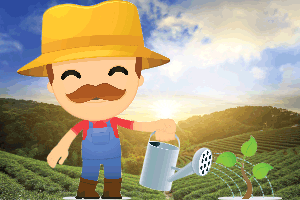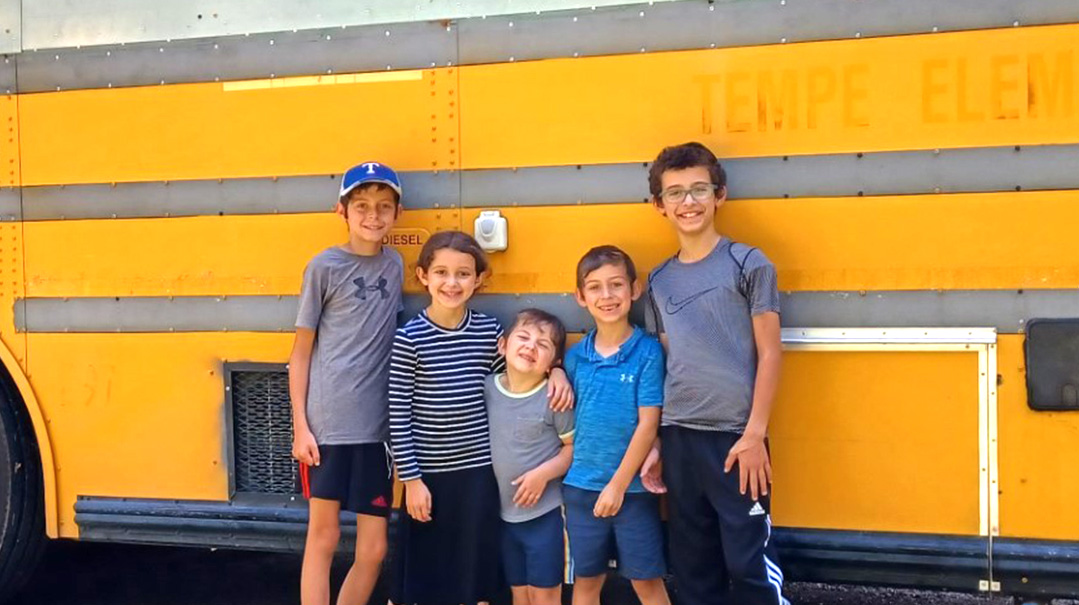Gut Shabbos, Eretz Yisrael!
| September 23, 2014
What is Shemittah?
Shemittah, or shviis, is a very special year that is kadosh to Hashem. Just like Am Yisrael rests on Shabbos, Eretz Yisrael rests during the seventh year. Fields, gardens, and orchards are left unworked.
Shemittah: Three Flavors!
Only Hashem knows the reason for the mitzvos that He gives us. We are, though, given what’s called a taam — a reason that we can understand, to help us feel connected to the mitzvah and appreciate it. In fact, that’s why the word taam means both reason and also… taste. Because it’s the reasons that give this mitzvah such a great flavor. So… here’s the mitzvah of shemittah like you never tasted it before!
Reason number 1:
A farmer says:
Just like Shabbos reminds us that Hashem created the world in six days and rested on the seventh, shemittah — which is like Shabbos a whole year long — reminds us that the earth didn’t come into existence by itself, nor did it always exist. It was made by Hashem. And it was made for a reason. Leaving our fields bare for a whole “Shabbos” helps us remember that.
Reason number 2:
A farmer says:
When I plow and sow and reap my harvest, it’s easy to think that the ground, and the yummy oranges I grow, as well as the potatoes and wheat, are mine. I can think they’ve grown only due to my hard work. Shemittah reminds me that the beautiful crops come from Hashem, and the very earth belongs to Him.
Reason number 3:
Farmer says: We all know that parnassah comes from Hashem. But by not working on my field, I really remember that. I exercise my bitachon muscles — but good! — and trust that Hashem will send me His brachah.
Rav Ephraim Wachsman was traveling in Eretz Yisrael during one shemittah year. He saw miles of beautiful vineyards, the vines laden with plump, delicious grapes.
Noticing a man who looked like the owner of the vineyard, he asked him: “How can you do this? How do you have the strength to watch all these beautiful grapes — worth thousands of dollars — go unpicked?”
The farmer’s reply was simple: “Zeh lo sheli. Zeh shel HaKadosh Baruch Hu — They’re not mine. They belong to Hashem!”
Who’s A Strongman?!
Shemittah is one of the hardest mitzvos in the whole Torah! For an entire year, farmers are commanded to stop working their fields, and leave the produce hefker — open for anyone to come and take. In doing so, Chazal call them giborei koach — spiritual strongmen!
The Torah itself talks about how hard it is for farmers to abandon their farms:
“And if you say, What shall we eat in the seventh year?… [Hashem replies] And I will command My blessing on you in the sixth year and you shall have produce for three years!”
There are amazing stories of farmers who saw a special brachah of Hashem by keeping shemittah.
But wait…
What’s the big deal about taking a yearlong holiday (called a sabbatical, related to the word Shabbos) from work? Sounds like a great idea. Mr. Farmer can just put his feet up, enjoy the country air, play a game of backgammon….
So what’s so hard about shemittah?
Lots.
Farmers rely on the money they receive when they sell the food they grow. If they can’t grow any food to sell, where will their money come from? If that’s not hard enough, farmers have a lot of very expensive, specialist equipment — tractors, combine harvesters, even small planes that fly over the fields and spray the crops with pesticides, chemicals that kill off nasty bugs.
Usually, farmers don’t buy these machines, they rent them. That means they have to continue paying rent for the whole of shemittah, even if they’re not using them. And what about their workers? Farmers often use workers from other countries, and they work hard teaching them how to work the machines and tend to the crops. During shemittah, these workers find jobs on other farms.
Which is where Keren Hashviis comes into the picture.
What is Keren Hashviis?
Keren Hashviis is an organization dedicated to helping farmers observe shemittah. From down south to up north, their representatives travel through Eretz Yisrael, talking to farmers. They advise farmers on how to prepare their fields for shemittah and explain what work can and can’t be done in the fields. They also help them with technological inventions that will help keep the fields in good shape for the coming year. Some fields are set aside for otzar beis din, others are simply left hefker.
Most important, Keren Hashviis provides a monthly stipend — like a wage — to every farmer. This helps keeps him afloat during his yearlong Shabbos.
Meet the Farmers
Farmer Goldberger
Dovid Goldberger owns a vineyard, a dairy farm, and a carefully guarded crop of wheat that’s used for shemurah matzah. He sells his milk to Tnuva, Israel’s largest dairy. He’s been working as a farmer for 40 years, he loves Eretz Yisrael, and the mitzvah of shemittah is very precious to him.
“When I work in my fields,” he says, “I don’t wear gloves. That’s because I want my hands to touch the precious earth of Eretz Yisrael.”
On a regular working day, Farmer Goldberger davens Shacharis early and goes to a shiur. After breakfast, he goes straight out to work in his fields and tend to his cows. He stops for a quick lunch, after which it’s straight back to the farm until dinner. Though he’s exhausted from a long day’s work, he learns daf yomi before he goes to sleep.
Just before last shemittah, Farmer Goldberger stocked up on two years’ worth of animal feed to give his cows. That way he’d have no problems during shemittah. Well, during shemittah, the price of animal feed became very expensive. Farmer Goldberger saved thousands of shekels! “I saw the Torah’s words of ‘I will command My blessing’ come true on my own farm!”
So, what does Farmer Goldberger do during shemittah? He’ll be learning Torah in a beautiful shul on his moshav.
Farmer Levi
Ovadia Levi farms wheat and citrus orchards on Moshav Peduyim, down south, near Ofakim. He’s been living there since he was six years old when his family made aliyah from Yemen. He and his three brothers farm lemons, esrogim, hadasim, and wheat.
“People who live in cities can’t imagine a farmer’s life,” he begins. “You go to the store and buy bread, and don’t realize that the bread is made from flour, which comes from wheat. But to grow the wheat, you have to first prepare the soil, the earth has to be nourished. Then comes the planting. Israeli farmers are at the forefront of amazing changes in this field.
“I’ll give you an example. We plant vine tomatoes, instead of regular tomato plants. Why? Because when it comes to picking the ripe vegetables, it’s much quicker and less work to simply pluck off a bunch of seven or eight shiny tomatoes than to pick seven or eight individual tomatoes. That way, we save time and money, paying workers. We’ve got lots of good ideas. But still, you never know when the seeds have some kind of infection and are not good.
“When the ground is ready and the seeds are good, you have to know how to grow each crop. Every fruit and vegetable has its own optimal conditions, and you have to get to know that. How much pesticides each crop needs, what’s a good type? Make a mistake and the crop is in danger. How much water each plant needs, and when. Again, if you water too much or too little, the crop won’t grow like it should. And of course, we’re dependent on the weather and the rainfall. Even if you have an irrigation system set up, if it’s too hot or cold, the crop will die, and your entire year’s work will be ruined. That’s why, every single day, I wake up in the morning and say, ‘Hashem, give us rain, send brachah down on the fruits.’ ”
Farmer Levi is very busy as he strolls through his lemon groves, breathing in the fresh, zesty scent. He talks to the truck driver, to the distributor, who picks up the produce and takes it to the store. He talks to a new supplier who will sell him the bins he needs to collect the lemons. Every detail has to be taken care of.
This year, Farmer Levi is amazed at his lemon trees. He explains: “Each tree yields around 100 to 140 kilograms [220 to 300 pounds] of fruit.” He points to huge bins that stand around the orchard: “Usually, it takes around four trees to fill each of these half-ton bins. This year, the trees are just groaning with fruit. This year I can fill an entire bin with the fruits of just one tree. That means that each tree is giving four times the amount of a regular year. See it with your eyes.” He points to another orchard, this one filled with apple trees. “And my fellow farmers have all seen the brachah!”
The Shemittah Dictionary
Hefker:
During shemittah, fields must be left hefker (ownerless). Anyone can come along and pick an apple or orange, make a brachah, and take a bite. Traveling through Eretz Yisrael, you might see a lot of signs declaring a field or orchard hefker. Even without the sign, it’s permissible to take the produce, but it’s derech eretz to ask permission before doing so.
Sefichim:
This means what grows during shemittah. An example is vegetables, where you plant them in the soil and they grow a few months later. To prevent people from planting their fields during shemittah and then saying that the veggies grew by themselves, Chazal forbade eating sefichim.
Fruits aren’t included in this prohibition — no one can plant a lemon seed and expect to harvest lemons a few months later! That’s why bananas are also not subject to the issur of sefichim.
Some opinions say that some types of flowers are sefichim, too. In Eretz Yisrael, many people only buy flowers with a hechsher during shemittah.
Otzar Beis Din:
The delicious fruits hanging on the trees don’t have to be left to rot. The beis din makes a warehouse (an otzar) where shemittah produce is collected, stored, and distributed to people who live in cities far away from the fields, where they can just enter and pick an apple or two.
So, is the fruit free for taking? The beis din normally charges a small fee to cover the wages of the people who pick, transport, and distribute the fruits. But it’s cheaper than usual, because the farmer isn’t being paid for the actual merchandise.
Careful, though — shemittah food can’t be thrown away, and must be treated with special care. Leftovers are wrapped and placed into a special garbage can, where they rot. Only when the food has decayed can it be thrown out.
Pruzbul:
The Torah tells us that, come shemittah, all loans are canceled. So, if Reuven lends Shimon $10 on Elul 15, he can’t ask for it back a month later.
But wait a minute, won’t that mean that, knowing shemittah is coming, Reuven will refuse to lend Shimon money? That’s why, 2,000 years ago, Hillel Hazakein noticed that people weren’t lending money as shemittah year approached, and that meant poor people couldn’t borrow money they needed. So Hillel instituted something called a pruzbul, a written document allowing debts to be collected even after shemittah. So Reuven gets back his $10. Phew!
The word pruzbul actually comes from the Aramaic: pruz bulli butti, which means a law for the rich and the poor.
Number Game:
Eretz Yisrael is made up of 5.4 million acres, and 12% of this is used for farms — a grand total of 648,000 acres.
Whoa, that’s a lot!
So what grows on these farms?
Grain (like wheat): 331,000 acres
Vegetables: 98,000 acres
Fruit orchards: 156,000 acres
Citrus fruits: 45,000 acres
Greenhouses (in which grow yummy bug-free lettuce and cabbage): 18,000 acres
Busy Bee
How many special sevens can you think of? Here are just a few to get you started…
- There are 7 leap years in each 19-year cycle of the Jewish calendar
- 7 gates leading into the Beis Hamikdash
- 7 weeks in the Omer
- 7 notes on the musical scale
- 7 seas of the world
- 7 children of Leah Imeinu — six sons and one daughter
- 7 cows and stalks of grain in Pharaoh’s dream
(Originally featured in Junior, Issue 528)
Oops! We could not locate your form.





